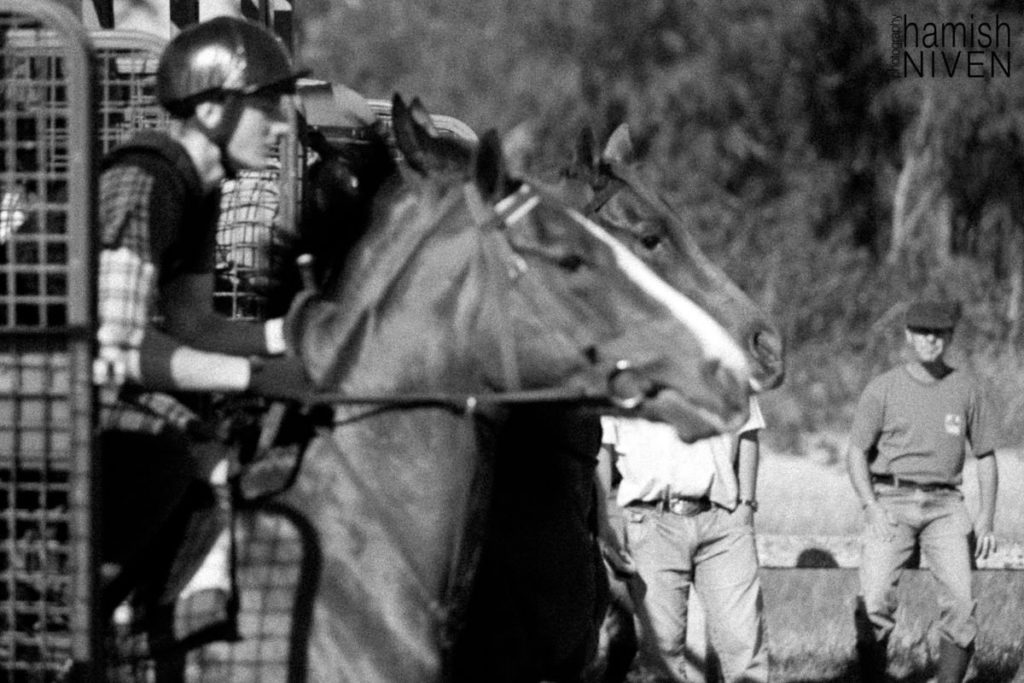Charles Darwin is credited with saying, “It is not the strongest of the species that survives, nor the most intelligent that survives. It is the one that is most adaptable to change.”
Therefore it was interesting to read the presentations from this year’s Jockey Club Round Table with regards to racing and the challenges it currently faces.
Back in 2015, Racing Australia’s Chief Executive Peter McGauran went on record to say, “We have to meet community expectations. The idea of a competitive animal sport operating in its own bubble is archaic. We operate under a social licence.”
That license is getting harder and harder to keep and the general opinion by the outside world (those that even know racing exists) is that we are not terrifically nice people.
We have heard similar assertions from Dr Iris Bergmann at the ITBF Congress back in January 2017. We’ve heard them from Vicky Leonard. We’ve heard it nearly every year in some form or another from the various animal welfare groups and it is clear racing can only continue as long as we conform to, or at least fly under the radar, of accepted society norms and standards.
These are changing fast and racing either has to keep pace, or risk falling by the way side. And it was a strong theme at this year’s Round Table.
James Gagliano, President and Chief Operating Officer of The Jockey Club in the USA, cited that the latest McKinsey report found over 50% of casual racing fans would stop betting if they knew horses were mistreated, and that new fans specifically objected to the use of the whip. In a survey of the entire fan base, McKinsey found the top concern was treatment of horses after retirement, followed by day-to-day treatment of horses in training; and, third, illegal doping.
Simon Bazalgette, Group Chief Executive of the UK Jockey Club cited welfare, and more importantly, the PERCEPTION OF WELFARE as ‘probably our number one risk factor in the sport’ in the UK. He made the very valid point that the majority of ‘Joe Public’ has a very simplistic view. “If we don’t deal with them, they’re the ones who end up changing laws and getting things banned and those kind of things,” adding, “So if we don’t get out there and get the message out to that wider group and we just speak to people who already know about racing, we could have a major problem coming down the line.”
Change
During the furore surrounding the Melbourne Cup back in 2014, one of the most thought-provoking comments came from Victoria Doyle who said, “horse racing is an easy target – only because they let themselves be”.
While I agree with her in many respects, the good news is we don’t have to be a target. And the more organised and proactive we can be, the better our chances. But we have a bit of catching up to do.
South African racing has inched forward with the creation of its rehoming rule. The practical application may be subject to debate, but it’s a start. If the CEO would return emails regarding a rehoming committee, that would be another quantum leap forward.
Barrier Trials were another great step towards enhancing transparency and consumer confidence in our sport. It would be a shame if a lack of house-keeping shot it in the foot.
Rules Are Not All Created Equal
Why do I say that? Well, in theory, Barrier Trials are run under the Rules and Constitution of the National Horseracing Authority (“NHA”). In case you think the Operators fall outside those rules, allow me to disabuse you of that notion. For the sake of expediency, I’m selecting the highlights reel, but my theory is easily proven with The Operators Rules (yes, they do exist), under section 44 of the NHA’s Rule Book, which reads as follows:-
44.1 – A RACING OPERATOR shall be bound by, and shall hold its RACE MEETINGS under the RULES (all of them). That basically says it all as far as I’m concerned, but if you remain unconvinced, there are a few more to support my statement.
44.6 – A RACING OPERATOR shall observe, abide by and enforce the CONSTITUTION and the RULES.
Rule 46 states that, “All meetings at which RACES take place shall be run in terms of the RULES.”
Section 49, which pertains to entries and Subsection 49.1 clearly states “All entries, however made, are subject to the Rules, the Conditions and the Race Requirements. In the event that there is a conflict between the Rules, the Conditions and/or the Race Requirements, the Rules shall prevail.”
And so on, and so forth.
So it is clear ] Gold Circle is bound by the Rules of the NHA.
But of course the exception proves the rule and it seems when it comes to Barrier Trials, they do not.
Que?
Exactly. There are no official NHA rules to govern Barrier Trials and therefore, as matters stand, Trials are conducted in some kind of limbo where some rules count, but some do not (sounds like business as usual, really!) Jokes aside, it’s hard enough to enforce existing rules, grey areas are tantamount to an engraved invitation for trouble.
Why This Presents A Problem
Barrier Trials, in their present form, contravene a number of existing NHA Rules, including the majority of section 62, the Rules of Running, and the following subsections in particular:-
62.1 Every HORSE shall be run and shall be allowed to run to the best of its ability and on its merits.
62.2 The RIDER of a HORSE shall:-
62.2.1 take all reasonable and permissible measures throughout a RACE to ensure that his HORSE is given a full opportunity to win or to obtain the best possible placing;
62.2.3 ride his HORSE out to the end of a RACE to the satisfaction of the STIPENDIARY STEWARDS.
Section 62 has already caused considerable debate, as well as push back from the jockeys, who risk fines if they are deemed to be falling foul of 62.2.1 in particular. However, they are, in theory, giving horses a glorified gallop, in which case you might not want a horse pushed to obtain its best possible placing, and rather just to have a pleasant schooling outing. Which then puts both the jockeys and the Stipendiary Stewards in an invidious position. Should horses be ridden out in Trials, or should they not?
Medication
 The other contentious area is Rule 73, which relates to Prohibited Substances and again I’ll just select the most relevant bits:-
The other contentious area is Rule 73, which relates to Prohibited Substances and again I’ll just select the most relevant bits:-
73.1 Any PERSON who administers a PROHIBITED SUBSTANCE to a HORSE, or is party to, or assists, or allows or incites any individual to administer a PROHIBITED SUBSTANCE to a HORSE, at any time which results in or would have resulted in a PROHIBITED SUBSTANCE being present in a HORSE:
73.1.1 when it is presented on a RACE COURSE to run, or runs in a RACE; or
73.1.2 at any time within a period of 48 hours preceding the day of the RACE in which it is or was due to run; or
73.1.4 at any time on the day when it is presented for the purpose of determining whether a suspension should be lifted or for the purpose of a gallop to determine its fitness; shall be guilty of an offense.
As matters stand, it is public knowledge Barrier Trial horses do not have specimens taken post-race, which, reading between the lines looks to me like an invitation for trouble. I’m not saying that not testing trial horses necessarily implies people are running horses on medication, but let’s be fair, if we could rely on everyone to be law-abiding citizens, there would be no need for rules in the first place. It seems a little counter-intuitive that the mechanism designed to enhance consumer confidence, has missed something so fundamental, but if we have rules prohibiting medication in normal racing, it stands to reason the same should apply to Barrier Trials. Frankly, it boggles the mind this has not been done already.
Either way, the status quo is far too vague and there are far too many questions, of which the most pressing is ‘what has the NHA been doing all this time?’ Gold Circle gave plenty of notice that they were launching the initiative and the first Barrier Trial was conducted on 12 November 2017. That’s nine months ago. If we can have Rule 47.3.3 for Match Races (something we haven’t seen since the early 90’s), then surely we ought to have Rules for things that are happening on a regular basis?
Why the rush?
While I understand the NHA does not always move as quickly as one might like, there are plenty of instances of Rules appearing (or disappearing) overnight, so they can certainly be remarkably speedy when sufficiently motivated.
I generally find loss of life to be a fairly good incentive for action and as we have reached the somewhat dubious milestone of our first Barrier Trial fatality, it seems silly to leave loose ends that might come back to haunt us.
We can’t change the past, but we can certainly improve things going forward and I think it’s time we do.
So now for some good news. Happily, all of the above is easily remedied by the simple addition of a section in the Rule Book to deal with Trials – and voila! Then the job’s done and everyone knows where they stand. Plus, as a handy extra, it prevents any unwanted criticism. So if the NHA would just come to the party and organise some Rules to cover the thing, then we can all get on with our lives.











